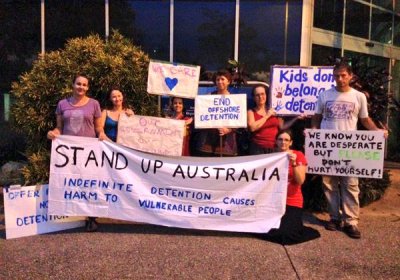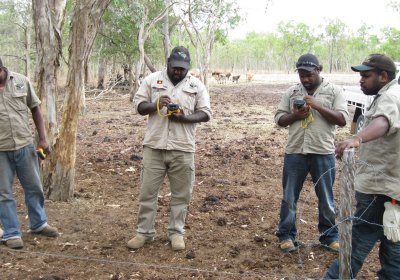A 59-year-old Aboriginal man died in Darwin on May 21 while being held under controversial new “paperless arrest laws”. These laws give police the powers to arrest people for summary offences — such as “obscenity”, undue noise, offensive language — and hold them for up to four hours at a time.
In NSW, a program that has been proved to prevent Aboriginal deaths in custody has lost funding under the federal government’s ironically named Indigenous Advancement Strategy.
Emma Murphy
 More than 100 people gathered in a park in Katherine on March 24 to launch the Frack-Free NT Roadshow, a group of pastoralists, traditional owners and environmentalists doing community education and outreach in the Roper and gulf country.
More than 100 people gathered in a park in Katherine on March 24 to launch the Frack-Free NT Roadshow, a group of pastoralists, traditional owners and environmentalists doing community education and outreach in the Roper and gulf country.
Last week, as mainstream media across Australia reported on recovery efforts in Queensland following Cyclone Marcia, thousands of Aboriginal people displaced by a different cyclone in the Northern Territory were all but ignored.
***
DONATE TO THE CYCLONE LAM DISASTER SUPPORT CAMPAIGN
***
On February 9, the Grandmothers Against Removals joined a national sit-in protest at Parliament House in Canberra.
This group of Aboriginal women has campaigned tirelessly to raise the issue of what they call the “Stolen Generation of the 21st Century”. Despite the official policy of child removals being over, Aboriginal children are today placed in “out of home” care at record rates.
A popular argument suggests Aboriginal people always burned country so non-Aboriginal Australians should too, albeit for modern purposes, such as fuel reduction burns. Historian Bill Gammage argued this in the popular and influential book The Biggest Estate on Earth (2011).
Remarkably, the book has attracted the praise of writers from both the left wing Green Left Weekly and the far-right Institute of Public Affairs (IPA).
Fifteen people gathered outside the Department of Immigration and Border Protection in Darwin on January 19 to show support for asylum seekers and protest against indefinite mandatory detention.
The vigil was called by the Darwin Asylum Seeker Support and Advocacy Network.
It was an opportunity to voice concern about the deteriorating health of an Iranian man in detention in Darwin, who had been on hunger strike for more than 50 days, and the ongoing hunger strike, protests and violent clashes inside the Manus Island detention centre.
Joseph Elu, chair of the Torres Strait Regional Authority, told Radio National’s PM on January 5 that the islands that have been home to Indigenous people for thousands of years are “being inundated”, right now because of climate change.
“A couple of our islands, the tide rises over the sea walls of the beachfront and it flows under the houses and out the other end ... They’re predicting that in 100 years, then they’ll go under.”
The Northern Territory government released the draft report of the independent Review of Indigenous Education in the Northern Territory on February 7. The government’s website says the review aimed to “get an informed understanding of the impact of current programs and initiatives”.
If the report’s recommendations are indicative of government intent, education for remote Aboriginal children in the NT looks set to suffer more blows.
The Country Liberal government of the Northern Territory announced on October 26 it was extending a reservation over Darwin’s rural area to “protect rural and rural-residential areas of the Greater Darwin region from oil and gas development”.
“Whilst the Country Liberal government is open for business, we know it is not practical to have oil and gas development in the middle of the Greater Darwin Region”, said mines and energy minister Willem Westra van Holthe.
A leaked draft of the second Intergovernmental Panel on Climate Change (IPCC) report, due to be released in March, gives a sobering picture of what lies ahead for Aboriginal communities in Australia as climate change intensifies.
Last month, the IPCC said it was 95% certain that human activity was the main cause of climate change. The recent leaked report did not look at the science, but rather the impacts climate change will have, particularly in areas of vulnerability and adaptation.
Groggy
Art exhibition by Todd Williams & Therese Ritchie
Northern Centre for Contemporary Art
Viney Lane, Darwin
Until October 12
“My name is Chips Mackinolty and I am an alcoholic …
“Everyone assumes that grog is an exclusively Aboriginal problem. That is simply not true. Around 50% of Aboriginal people don’t drink at all.
“If the Northern Territory were a nation, we would have the third-highest per capita consumption in the world, and that is not down to Aboriginal Territorians, but to non-Aboriginal people living here.”
About 40 people gathered at Reg Hillier House in Darwin’s rural area on August 15 to discuss threats posed by petroleum companies wanting to explore for oil and gas.
Applications for exploration under the Petroleum Act, which could include oil or gas, have reached the outer rural areas including the entire Cox Peninsula, parts of Humpty Doo and Howard Springs, the Dundee area and Litchfield National Park. Exploration may involve using the controversial method of horizontal hydraulic fracturing (“fracking”) if shale gas is found.
- Previous page
- Page 3
- Next page










